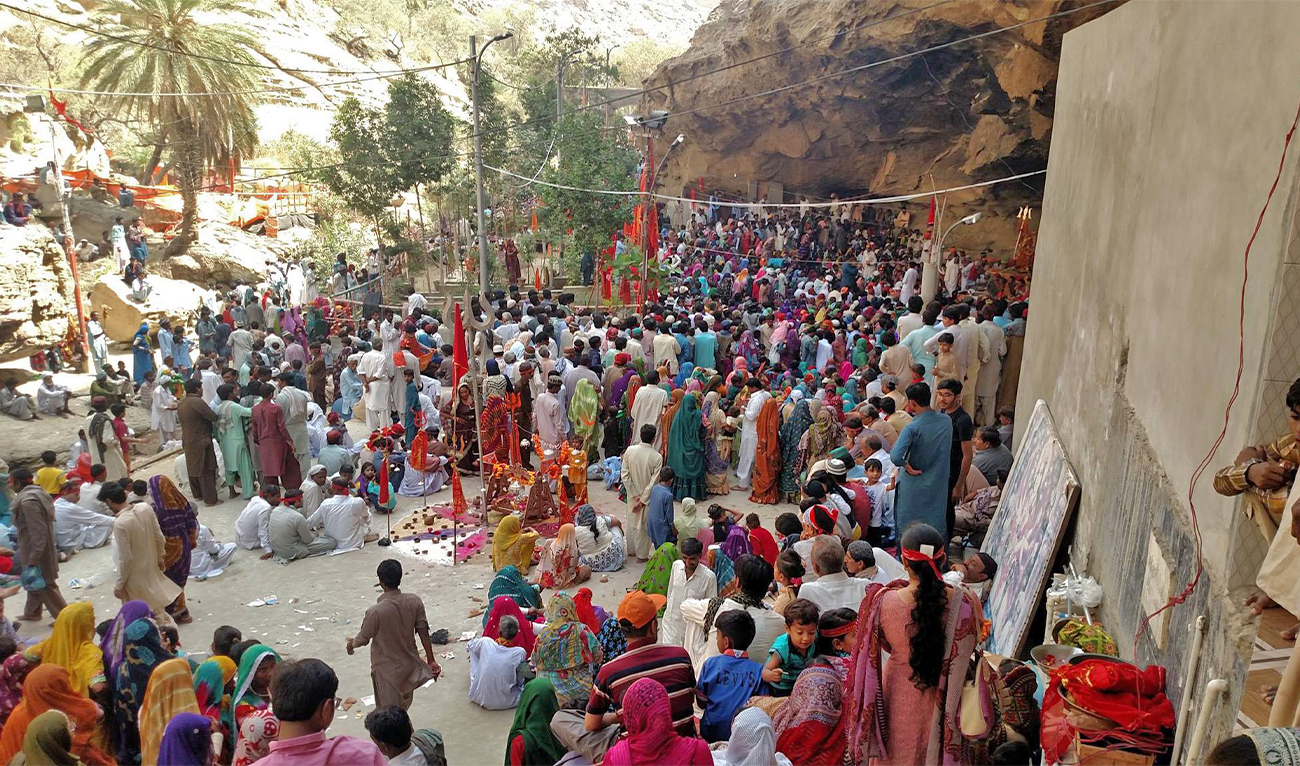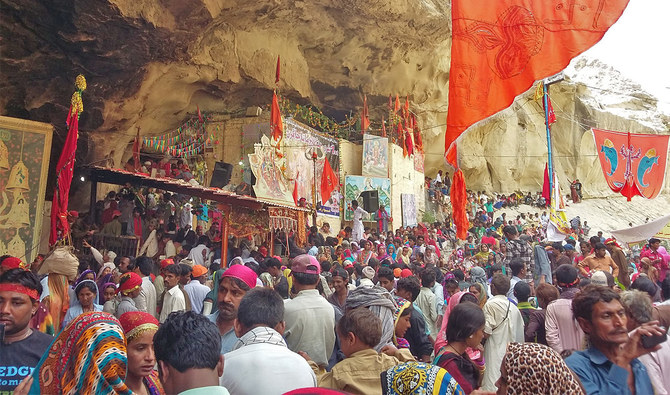QUETTA: With the rugged mountains of Pakistan’s southwestern Balochistan province to their left and a long road ahead, thousands of Hindu men, women, and children trudge along with water coolers in their hands and their belongings over their backs to reach the ancient Hinglaj Mata temple.
The ancient cave temple, located in Balochistan’s mountainous Hingol area in Lasbela district, is over 5,000 years old. It comes alive every year during the three-day Hinglaj Mata festival, arguably Pakistan’s largest Hindu festival, which attracts over 100,000 devotees from all parts of the country.

Hindu pilgrims are pictured climbing down the stairs of the Hinglaj Mata temple during the three-day Hinglaj festival in Pakistan's Lasbela district on April 28, 2023. (AN photo)
Pakistan, which gained independence from the British in 1947, is home to over 4.5 million Hindus. The festival, which began on Friday, will conclude today, Sunday, after three days of high priests chanting mantras and beseeching Hindu gods to accept the offerings of the devotees and bestow them with peace and prosperity.
According to Hindu mythology, Lord Vishnu cut up the body of the Hindu goddess Sati into 50 pieces, which fell to the earth. Her head, it is said, fell at Hinglaj, and it has since been the site of revered pilgrimage. According to another popular Hindu belief, Hinglaj Mata, a deity, came to fight against the oppressive monarch of Hingol. She fought and defeated the brutal tyrant and continued to live in the area.
Vesemal Kidwani, who is managing the annual festival as the general secretary of Hinglaj Welfare Society, has been visiting the site for the past 22 years.
“Hinglaj Mata temple is the holiest site for the entire Hindu community in the world, and we are lucky that this site is situated in Pakistan’s Balochistan province,” he told Arab News.
“Hundreds of thousands of devotees come to this site by walking about five kilometers, but you can see a smile on their face because they are optimistic that they will get something from this religious site,” he added.

The picture posted on April 13, 2017, shows Hindu devotees celebrating the Hinglaj Mata festival at the Hinglaj Mata temple in Pakistan's Lasbela district. (Hinglaj Mata Mandir, Balochistan/Facebook)
Hindu elders said the temple was also famous across the border in India, and many people in the neighboring state longed to visit the place. Jaswant Singh, the former foreign minister of the neighboring state, visited the cave temple in 2006 to foster peaceful relations between the two countries.
Pakistan inaugurated the Kartarpura Corridor in 2019, a visa-free border crossing which provides India’s Sikh community access to the birthplace of the founder of their religion in Pakistan’s Punjab province. A Pakistani senator, Dinesh Kumar, said the government wanted to do something similar for Indian Hindus to facilitate their pilgrimage to Hinglaj.
“We wanted to open a Kartarpur-like corridor for the Hindu community to visit Hinglaj, but due to the tense Pakistan-India relations, we could not implement the plan,” he told Arab News.

The picture posted on June 20, 2018, shows Hindu devotees heading toward the ancient Hinglaj Mata temple in Balochistan’s mountainous Hingol area in the Lasbela district. (Hinglaj Mata Mandir, Balochistan/Facebook)
Kumar said Hindu pilgrims spent three days outside the temple under the sky to attend the festival, adding the government was now constructing lodges for them by spending about Rs500 million ($178,597).
“Annually, more than one million Hindu pilgrims visit this site,” he continued. “We have the complete infrastructure for this religious site situated in the mountains while more facilities will be provided to Hindu worshippers.”

The picture posted on April 13, 2017, shows Hindu devotees heading toward the ancient Hinglaj Mata temple in Balochistan’s mountainous Hingol area in the Lasbela district. (Hinglaj Mata Mandir, Balochistan/Facebook)
Balochistan is a volatile province that has been the site of a prolonged insurgency, with several separatist and militant groups operating in the region, which boasts vast mineral resources.
Ravi Kumar, 53, came all the way from Pakistan’s southern Hyderabad city located over 300 kilometers away from the temple. He praised the security measures taken by the authorities, saying they had enabled thousands of Hindu men, women, and children to perform their religious obligations with ease in the area.
“Our gods and goddess Rama, Shiva, and Parvati visited this shrine thousands of years ago to pay homage to Hinglaj Mata,” he added. “Hence, thousands of Hindu devotees come here annually for worship.”












